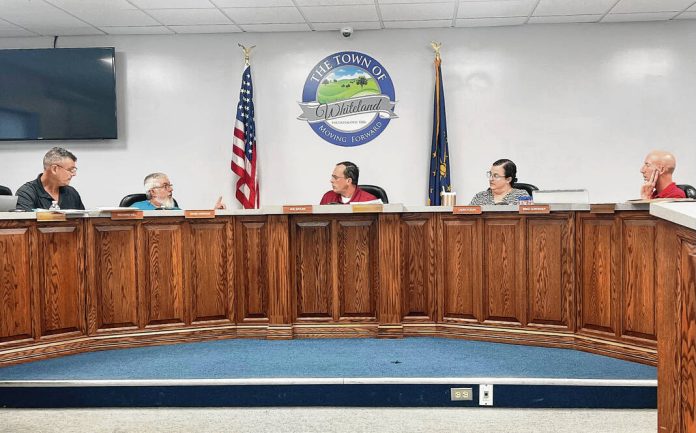Whiteland residents now have written conduct guidelines for public meetings.
The Whiteland Town Council approved last week guidelines for conduct at public meetings based on an Indiana bill. HB 1338, which goes into effect July 1, allows governing bodies of certain local government agencies to adopt rules or policies governing the conduct of meetings.
Melissa Fraser, Whiteland clerk-treasurer, said via email that she is unaware of any public meeting guidelines for the town prior to the new ordinance.
Although governing bodies could already adopt rules to govern public comment and maintain order in meetings, HB 1338 outlines specific things that officials can do if the public is disruptive. Among other things, the bill outlines that governing bodies may issue warnings to disruptive attendees and direct a law enforcement officer to remove them.
The bill was brought forward by State Rep. J.D. Prescott, R-Winchester, because of a Winchester resident who routinely caused disturbances at public meetings to feed his YouTube channel, the Indiana Capital Chronicle reported.
Whiteland’s meetings have not been disruptive lately, however, the council brought forward an ordinance based on HB 1338 to formalize a policy for public decorum.
The ordinance states that attendees must respect all people and refrain from personal threats, profanity, obscenity, hateful epithets and demeaning language based on a person’s race, religion, sexual orientation, ethnicity, gender or disability.
There should be no applause, cheering, booing, heckling, yelling or screaming and no conduct that is otherwise distracting, disorderly or disruptive, according to the ordinance. Attendees should obey the direction of the council as enforced by the presiding officer, which would typically be the council president.
Unless specifically listed on the agenda or with permission, attendees aren’t permitted to speak during meetings except during a public hearing or public comment. The public has up to three minutes each to present and speakers representing multiple individuals have up to five minutes. The council can designate the total amount of time allotted for the public or attendees to speak on a case-by-case basis, the ordinance says.
The council can ask questions at any time, and the question and response will not count against the speaker’s allotted time. The town council and representatives of the town are not obligated to answer any questions raised but may do so at their discretion, according to the ordinance.
A speaker can request additional time for good cause shown at the discretion of the council president. The president may also cut presentations short if they are irrelevant, repetitive or constitute disorderly conduct if the presenter has been admonished at least once. However, a presentation cannot be cut short based solely on the content of the presentation, the ordinance says.
If a person is exhibiting disorderly conduct during a meeting, they will receive three warnings. Upon issuing the third warning, the council president can ask the attendee to leave and they can be removed by law enforcement if they refuse.
Meeting attendees will be notified of the rules of conduct in a visible area at the entrance of the meeting location or by making an announcement at town council meetings prior to taking oral public comment, the ordinance says.
Other parts of the county
Government entities in Johnson County largely haven’t had issues with the public’s conduct at meetings.
Adam Gadberry, county attorney, said via email that in the over two years he’s attended the county council and commissioner meetings, he has not witnessed disruptions at either. For county meetings, there are rules including a five-minute time limit for public commenters without the council president’s permission and how to supplement comments with written materials.
He said the rules seem to be working, though if county officials wish to review and supplement them in light of HB 1338, they can do that.
In Franklin, people voicing their opinions have been respectful and city officials have also been respectful, said Steve Barnett, mayor of Franklin. At each meeting the city council offers two minutes for public comment for topics not covered on the agenda in addition to opportunities to comment on agenda items during the meeting.
“Have we had meetings where we have remonstration and people stand up and voice their opinions? We absolutely have and we encourage that, but I also feel like our meetings have always been cordial and we give people an opportunity to speak and we haven’t had to set any rules,” Barnett said.
Greenwood’s Council President Mike Campbell said doesn’t foresee the council creating new guidelines at this time. Right now, the public has two opportunities at each council meeting to address the council with a five-minute time limit.
“We’ve never had any real issues. Once upon a time, we had a guy who was a little belligerent but normally we don’t have any issues,” he said. “The public has conducted themselves very well and we’ve never had to think about doing anything other than what we currently do.”
The Daily Journal reached out to Bargersville, Edinburgh and New Whiteland for comment, but didn’t hear back from them before publication.
Trafalgar’s town council is expected to discuss the new law at its Thursday meeting, said Donna Moore, clerk-treasurer.
Daily Journal reporter Jayden Kennett contributed to this story.





